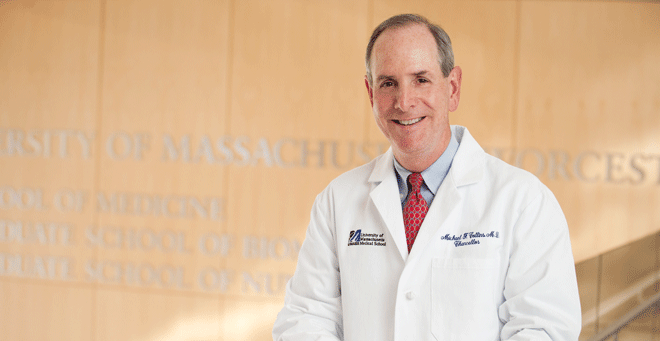 |
|
|
Chancellor Michael F. Collins |
Chancellor Michael F. Collins says Gov. Charlie Baker’s recommendations to stem the opioid crisis deserve a fair hearing and expounds on how UMass Medical School is changing its medical education curriculum to address the problem, in a Nov. 20 Worcester Telegram & Gazette editorial.
“Governor Baker’s administration is to be commended for its serious, multi-faceted approach to stem the crisis, which has included partnering with medical schools on curricular enhancements to ensure future physicians are safe prescribers, having attained a greater understanding of the dynamics posed by this public health crisis,” writes Dr. Collins. “Other proposed solutions are at once sensible and provocative . . . given the severity of the challenges before us, these ideas merit serious consideration.”
Earlier this week, Collins announced that UMMS is incorporating into its School of Medicine curriculum for the current academic year specific training in support of 10 agreed-upon core competencies for the prevention and management of prescription drug misuse. At the governor’s request, deans of the state’s four medical schools came together with representatives of the Massachusetts Medical Society and the state’s Department of Public Health to reach consensus on best practices, which were publicly announced earlier this month. These 10 core competencies include the ability to evaluate a patient’s level of pain and risk of addiction; various patient-centered treatment options; evidence-based pain management; and the appropriate use of naloxone.
The initial phase of the program at UMMS will include intensive, performance-based training to provide all medical students with an opportunity to both attain and practice these competencies. Ultimately, this training will ensure that all School of Medicine graduates are prepared to be “sound prescribers” in the screening, prevention and management of prescription drug misuse. This initial phase is part of a longitudinal educational program that will establish a fully integrated curriculum to comprehensively teach and assess all 10 core competencies.
According to Massachusetts DPH data, in the first half of 2015 more than 110 people each month, on average, died from an opioid overdose, representing the highest opioid-related death rate ever recorded in the state.
Read Chancellor Collins’ full column at: AS I SEE IT: Stemming the opioid crisis
Related links on UMassMedNow:
UMMS implements curriculum changes in current academic year to address opioid crisis
UMMS working with other Mass. medical schools, governor on opioid prescribing practices
Gov. Baker names UMMS pharmacy director to Opioid Drug Formulary Commission
Paul Jeffrey to Fox-TV 25 Boston: We must expand opioid abuse treatment, prevention
Key role for pharmacists in stemming opioid abuse crisis
Opioid prescribing education program offered for physicians, providers